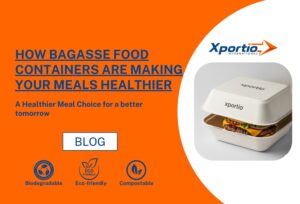10 Innovative Bagasse Products You Need to Try
As the demand for plastic free disposables continues to rise, bagasse—a natural byproduct of sugarcane—has emerged as a key material in the sustainable packaging movement. Unlike plastic, it’s biodegradable, compostable, and safe for health. Below are 10 innovative bagasse products you should know if you’re in the business of eco-friendly disposables.
Table of Contents
1. Bagasse Clamshells
These hinged containers are ideal for takeaways. Grease-resistant and microwave-safe, they offer a sustainable alternative to plastic clamshells without compromising on functionality.
2. Bagasse Round Plates
Lightweight yet sturdy, these bagasse tableware items are perfect for events and catering. They’re 100% compostable and hold both hot and cold foods easily.
3. Bagasse Bowls
With varying depths and diameters, bagasse bowls suit soups, salads, and snacks. Their natural finish and leak resistance make them perfect plastic free disposables.
4. Bagasse Mealtrays
These compartmentalized trays are designed for complete meal servings. Their strength and heat-resistance make them ideal for hospitals, airlines, and institutional catering.
5. Bagasse Square Plates
Modern and minimalist, square plates made from bagasse offer an elegant look for upscale food presentations. They’re a favorite among event planners and restaurants.
6. Bagasse Compartment Plates
Available in 3, 4, or 5 sections, these plates ensure food separation. Ideal for buffet and cafeteria settings, they’re durable bagasse products that replace foam trays.
7. Bagasse Square Bowls
Sleek and practical, these bowls are stackable and fit tight spaces. Excellent for desserts and side servings in delivery packaging or in-store food counters.
8. Bagasse Food Containers
With secure lids, these containers are perfect for takeaways. They maintain food temperature while being completely compostable, aligning with plastic-free packaging goals.
9. Bagasse Cups
These single-use cups resist heat and moisture, making them suitable for hot beverages. As plastic free disposables, they’re an ethical upgrade from PE-lined paper cups.
10. Bagasse Spoon & Fork
Cutlery made from bagasse offers a compostable alternative to plastic utensils. Strong and stylish, they perform well with solid or liquid-based meals.
How Bagasse Is Naturally Plastic Free
Bagasse is made from sugarcane fiber—specifically the dry pulp left after juice extraction. This fibrous material is 100% biodegradable, compostable, and contains no petroleum-based compounds. It offers the strength of paper with added heat and moisture resistance.
Its rise in the plastic free disposables market is driven by increasing bans on plastic and a shift toward renewable materials. Unlike plastic, which stays in the environment for centuries, bagasse breaks down within 90–120 days, returning to the earth as compost. This makes it ideal for bagasse tableware, helping brands meet sustainability targets without compromising on quality.
Why There Is a Huge Need to Replace Plastic Disposables
Plastic disposables contribute to microplastic pollution, landfill overflow, and long-term health risks. With heat exposure, plastics can leach chemicals into food—posing a serious hazard. Additionally, most plastics are neither biodegradable nor compostable, lingering in the environment for hundreds of years.
In contrast, compostable bagasse tableware is designed to degrade naturally. Governments and eco-conscious buyers are demanding better alternatives. The world needs plastic free disposables that are safe, effective, and scalable—and bagasse meets all three criteria. Making this switch is not just a trend but a necessity for both businesses and the planet.
Why Bagasse Has an Edge in Exports
Global demand for bagasse products is surging, especially in Europe, the U.S., and Australia. These regions are enacting strict bans on single-use plastics and offering incentives for importers dealing in compostable bagasse tableware.
For buyers, the benefits are clear: lighter shipping weights, reduced carbon footprints, and a premium eco image. As an exporter of plastic free disposables, offering bagasse-based solutions can open doors to long-term partnerships with eco-conscious distributors, retailers, and government suppliers. With the ability to customize and brand bagasse items, exporters can deliver both functional and marketable solutions for the global foodservice sector.
Conclusion
From round plates to cutlery, the innovation in bagasse products is transforming how we think about disposables. These items aren’t just substitutes—they’re upgrades in sustainability, performance, and brand responsibility.
As the world continues to embrace plastic free disposables, businesses and importers should look to bagasse tableware as a scalable, export-ready solution. Now is the time to adapt, align, and lead with products that serve both people and the planet.

